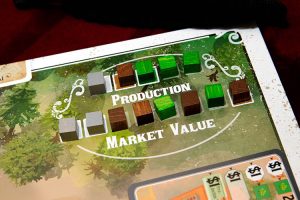 Saddle up board game lovers, we are headed out to Nevada City. The town is sprouting up around us and we are going to stake our claim to a homestead, create some resources, and maybe help build a few buildings. This will all center around a worker placement mechanism that gives a variable number and strength of actions.
Saddle up board game lovers, we are headed out to Nevada City. The town is sprouting up around us and we are going to stake our claim to a homestead, create some resources, and maybe help build a few buildings. This will all center around a worker placement mechanism that gives a variable number and strength of actions.
So let’s take a closer look at what Nevada City is all about and if it is worth adding to your game collection.
Gameplay Overview:
The hook of Nevada City lies in your family of workers. Your Pa, Ma, son, and daughter each have different skill sets and potentially a different number of actions available to them. On your turn, you’ll choose one of your family members and use up all of their action markers before play passes to the next player. In this way you may take anywhere between 1-4 actions at a time.

These action markers are essentially workers in a worker placement game. Like many such games, there is a central board where you can place workers allowing you to do all types of different actions. You can claim new property for your homestead, start building new establishments in town, or visit the places already built to accumulate commodities (which will in turn be used to build more buildings or fulfill contracts, which make up the bulk of the game’s victory points). Buildings, once complete, can also be used by other players but they will pay you for the privilege of doing so.
You can also spend your actions working your homestead, allowing you to produce crops on your farms, silver in your mines, or livestock on your ranches. These resources can be sold in town to earn money so you can buy the commodities needed for buildings. Some of your family is better suited to working certain types of property allowing you to be more efficient, but everyone can at least work one property tile at a time if push comes to shove. Throughout the game you’ll be able at add new workers to your homestead and potentially marry two of them into the family to keep them around after the end of the round.

Each round of the game starts with some upkeep that is vital to how everything plays out. The market will reset, changing both how many resources each type of property in your homestead will produce for the year and how much they can sell for. There are new building cards added to the available supply each round as well, which really makes the theme of an Old West city popping up throughout the years work.
You will also lay out event cards that will trigger throughout the round. These events range from mundane to devastating. They can change the values in the market, remove action markers from your family, or restrict the placement spots available at some buildings for the year.
The game ends at the end of the round when all of the building plots on the main board have been claimed or after the fourth round. Each player will have a secret goal card that scores for all players and then whoever has the highest VP total is the winner.

Game Experience:
The main appeal of the game for me, other than the theme, is the unique workers and being forced to choose which one to activate at which time for maximum efficiency. And this works really well at times. You’ll have a worker who may be really good at building things that cost brick resources, allowing you to complete it with less. And you may want to do that early in the round so you, or other players, can go to that building. But if your brick-laying specialist only has two action markers it means you won’t get as many early actions, leaving some of the cheaper worker placement spots on the table.

Unfortunately, it more often just doesn’t matter and you’ll default to the most-action family member first. Which, it’s hard to place too much blame there, maybe I just wasn’t planning well enough to take full advantage of my family member’s abilities. But, worse yet, maybe you have just the perfect plan—only for an event to be revealed that removes some of your action markers. Or completely wipes out the contracts for the whole remainder of the year. Or forces you to pay taxes for your buildings plunging you into debt and sending you to the bank for loans.
In the first round, there are 6 events that will happen. In the subsequent rounds, there are four. They fly in the face of euro-game sensibilities. While event decks are commonplace, I can’t remember playing a game with a more punishing one. Especially when the mechanisms really come down to make resources, turn into commodities, and then turn those into buildings. Optimization puzzle-like games are my jam. It’s what Nevada City starts out being—a game about maximizing the output you get with each turn. There are games where randomness and luck are well received but it feels out of place here.
There are advanced rules that can optionally be added, but nearly all of them increase the luck factor. Many of them use a single-suit A-7 poker deck. You can use it for a gambling action to potentially win a bunch of money (or possibly waste your action). It is also used in the “troublemakers” rule where unhired workers start causing problems and you have to fight them using your family’s gunslinging ability and a random card modifier.

Randomness aside, I would still have a hard time recommending Nevada City. The game can go on pretty long, even my euro-loving standards. You should expect a 3-4 player game to clock in near 3 hours. The game has 22 building cards, four of which are automatically built during setup. The other 18 get added throughout the rounds but don’t change game to game. And many of them are variations of the same thing. Three general stores that each have 3 of the 4 commodities, for instance. There weren’t enough interesting things going on or left unbuilt that I felt like I really needed to get this one back to the table over and over again to try something new.
The game itself is also plagued by issues with its production. The most egregious of which is the navy blue and black player color pieces. In everything but the best conditions they are difficult to tell apart. It doesn’t matter a ton because you really only need to know which buildings a player owns so you know who to pay. Rio Grande has said it was a mistake from the factory but also that they don’t see it as an issue.

The rulebook is also problematic. The issues range from tiny to still pretty small, but they are numerous. The layout is bad. There are many rules repeated over and over again. The components don’t match what the rulebook says in some cases. There is a publisher errata to help set things straight. But for me the worst offense of the rules isn’t one of wording or clarity. It’s the rule for marrying a worker into your family which reads:
“NOTE: This is the Old West and it is only acceptable to marry a man to a woman or vice-versa. Therefore, the maximum number of workers that can be married into the family is two.”
Now, history certainly doesn’t support the idea that there weren’t same-sex relationships in the Old West. Marriage, perhaps, but there is no need for this rule to exist in the game. The point of the mechanism seems to be to add more workers to your family. So let this history allow same-sex marriages. Or just don’t call it marriage and title it “hiring a permanent worker.” As Nevada City sits, it serves to make people feel excluded and “other” and it is exacerbated by the lack of non-white families in the game (there are some people of color on the art in the worker deck). This isn’t what our hobby should strive for.
Final Thoughts:
Nevada City has a great theme and a good spin on worker placement. It’s let down by randomness, lack of content, and production issues. Without all of the somewhat self-inflicted problems, there are the bones of a good game here but it just doesn’t all come together. And then it’s hurt by everything around it.
Final Score: 2 Stars – Overlong and problematic. Random events get in the way of efficiency.
 Hits:
Hits:
• The idea of workers with different numbers of actions and unique abilities is great.
• Love the Old West setting and the buildings becoming available each round makes it feel like the city is actually progressing.
Misses:
• Player color issues make playing with 4 players difficult.
• Random events are too impactful.
• Very little room for new strategies from game to game.























